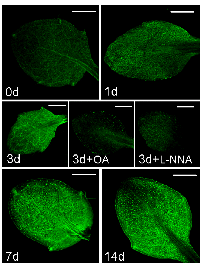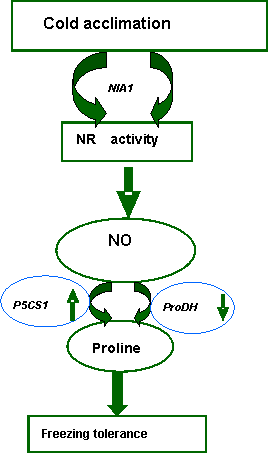Many plants from temperate and cold climates have evolved a mechanism to enhance their freezing tolerance during exposure to low, non-freezing temperatures in a process known as cold acclimation. NO is an important signaling molecule involved in many physiological processes in plants. Wenhao Zhang's group evaluated the role of NO in cold acclimation and freezing tolerance in Arabidopsiswild-type plants and the mutants nitric oxide-associated 1/resistant to inhibition by fosmidomycin 1, nia1nia2 andAtnoa1/rif1,which exhibit defects in nitrate reductase and reduced NO production, respectively. Cold acclimation induced an increase in endogenous NO production by upregulation of NIA1 gene, and the elevated NO level acted as a signal to enhance proline content, thus conferring tolerance to freezing. (Plant Physiology, 2009)


Figure. Cold acclimation induced a nitrate reductase-dependent NO production by upregulation of NIA1 gene expression, and the elevated NO promoted Pro accumulation by stimulating and suppressing proline synthesis and degradation, respectively, thus leading to enhanced freezing tolerance.
Many plants from temperate and cold climates have evolved a mechanism to enhance their freezing tolerance during exposure to low, non-freezing temperatures in a process known as cold acclimation. NO is an important signaling molecule involved in many physiological processes in plants. Wenhao Zhang's group evaluated the role of NO in cold acclimation and freezing tolerance in Arabidopsiswild-type plants and the mutants nitric oxide-associated 1/resistant to inhibition by fosmidomycin 1, nia1nia2 andAtnoa1/rif1,which exhibit defects in nitrate reductase and reduced NO production, respectively. Cold acclimation induced an increase in endogenous NO production by upregulation of NIA1 gene, and the elevated NO level acted as a signal to enhance proline content, thus conferring tolerance to freezing. (Plant Physiology, 2009)

Figure. Cold acclimation induced a nitrate reductase-dependent NO production by upregulation of NIA1 gene expression, and the elevated NO promoted Pro accumulation by stimulating and suppressing proline synthesis and degradation, respectively, thus leading to enhanced freezing tolerance.
